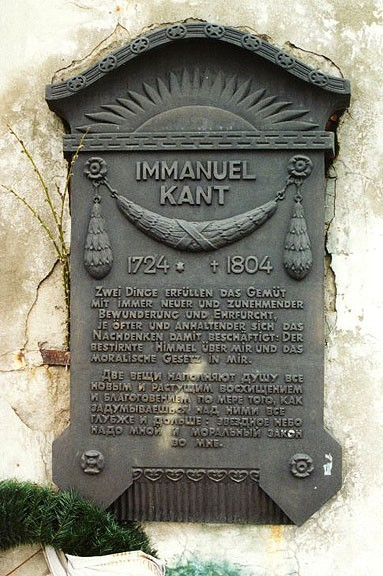Engraved on the tombstone of Immanuel Kant in Kaliningrad is this famous passage that begins the Conclusion section of his Critique of Practical Reason (1788):

Two things fill the soul with ever-renewed and ever-increasing admiration and awe, the more frequently and the more persistently we dwell upon them: the starry heaven above me and the moral law within me. (trans. Gabriele Rabel)
This passage was somewhat misquoted at the end of an article “Astronomical Considerations” in the 1 February 1820 issue of Wiener Zeitschrift für Kunst, Literature, Theater und Mode (Vienna Magazine for Art, Literature, Theater, and Fashion).
It is known that Beethoven read this article because he copied the same misquotation in his conversation book: “‘das Moralische Gesez in uns, u. der gestirnte Himmel über uns’ Kant!!!”
Over the next month or so, Beethoven composed a beautiful song with a similar theme.
The manuscript of Beethoven’s song “Abendlied unterm gestirnten Himmel” (Evening Song beneath the Starry Firmament, WoO 150) is dated 4 March 1820. It was published later that month in the same periodical where Beethoven encountered the Kant quotation.
The text of “Abendlied unterm gestirnten Himmel” is by H. Goeble, about whom literally nothing more is known, not even his first name. The four stanzas are set in a modified strophic form, in which the accompaniment varies much more than the vocal line.
In the fascinating and illuminating article “Beethoven’s ‘Abendlied’ and the ‘Wiener Zeitschrift’”, Barry Cooper shows how “Abendlied unterm gestirnten Himmel” was the perfect song for Beethoven at this time:
“Abendlied” is exceptionally rich in concepts that had great significance for Beethoven — indeed almost every line of the poem bears direct or indirect relevance to some of his own deepest thoughts and desires. By making a musical setting of it, he was able to meditate at length on each of its phrases, and the profundity of his meditations is reflected in the subtlety with which he follows every nuance of the text.
Here's Cooper’s English translation of “Abendlied”:
When the sun sinks down
And the day draws to rest,
[When] Luna gently beckons,
And the night descends;
When the stars shimmer gorgeously,
And a thousand sun-roads twinkle;
The soul feels so immense,
And squirms free from the dust.
It gazes so gladly towards those stars,
As if back to its fatherland,
Towards those distant lights,
And forgets earth's vanity;
It wants only to struggle and strive
To soar away from its shell:
Earth is too narrow and small for it,
On the stars it longs to be.
Though earth's storms are raging,
And false fortune rewards the evil,
Full of hope it looks upwards
Where the judge is enthroned in the stars.
No fear can more torment it,
No power can command it;
With transfigured countenance
It soars to Heaven's light.
A gentle hint thrills
Me from those worlds;
Not much longer, longer lasts
My earthly pilgrimage.
Soon I shall have reached the goal
Soon soared up to you,
And shall soon reap at God's throne
My sufferings' glorious reward.
#Beethoven250 Day 318
“Abendlied unterm gestirnten Himmel” (WoO 150), 1820
An English translation accompanies an animated score and studio performance by Peter Schreier.
#Beethoven250 Day 318
“Abendlied unterm gestirnten Himmel” (WoO 150), 1820
Hannah De Priest was scheduled to sing “An die ferne Geliebte” and the “Mass in C” this year, but this kitchen performance is marvelous.